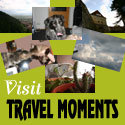Canada’s Big Five Animals
Everyone’s heard of the Big Five of the safari world – lion, leopard, rhino, elephant and buffalo – but it’s not just wildlife spotters in Africa who can play a bit of ‘animal bingo’ on their travels.
In the Canadian Rockies, the Big Five refers to some fauna of a very different, but no less impressive, kind: moose, elk, wolf, bear and deer. Of course, if you’re going to tick these off your list during your Rocky Mountain adventure, you first need to know what they look like and where to find them.
Moose
Don’t let their slightly goofy faces fool you; moose are not to be crossed. The largest member of the deer family, moose can weigh up to 700kg, stand up to 2.1m at the shoulder and their huge antlers can grow to as much as 1.8m across.
Moose are distinguished by their elongated faces, which when coupled with generally slow-paced movements make them seem endearing and almost comical. However, they can move with surprising speed when threatened, so don’t get too close.
Look for them in marshy areas and around ponds, although they are not particularly common in the Canadian Rockies so you’ll do well to catch a glimpse of one.
Elk
Confusingly, moose are called elk in Eurasia, but in North America they are most certainly different animals altogether. Although they are almost as big – weighing in at around 500kg and standing 1.5m at the shoulder – they are completely different in appearance, with short snouts and tall antlers, and no flaps of skin under their chins.
You might not actually need to venture into the wilderness to spot them either, as large herds live near the towns of Banff and Jasper.
Wolf
Although moose and elk are generally regarded as docile grazers, more scared of humans than we are of them, wolves have somewhat fearsome reputations. However, these hunters are also strikingly beautiful animals resembling German shepherds with grey coats.
Sadly, their perceived threat as a danger to communities and livestock has already seen them lose their protected status in some areas, putting them at risk from hunters. Jasper National Park is a great location for wolf spotting.
Bear
Perhaps the most iconic of species in the Canadian Rockies, the sight of a fully grown bear rearing up on its hind legs is a sight to behold.
There are two types of bear resident to the range: black and grizzly. Confusingly, black bears can be brown in colour, so you need to use other identifiers such as size and shape to differentiate between them.
Grizzlies are larger (second only in size to polar bears) and have a distinctive hump of muscle behind their necks. And while blacks are more common and might be seen feeding by roads, grizzlies tend to inhabit alpine areas.
Deer
There are two common varieties of deer in the Rockies: mule and white-tailed. Although they are similar in appearance – both have white underbellies – the mule deer is stockier than its white-tailed counterpart and, as the name suggests, has mule-like ears.
Expect to see the mule deer roaming through open forests in valley floors, while the white-tail grazes in thickets alongside rivers and lakes in the foothills of the huge mountains that give the region its name.
As well as wildlife spotting, Canada tours in the Rockies are also the perfect opportunity to engage in outdoor sports – with white water rafting, hiking and kayaking just some of the activities on offer.

